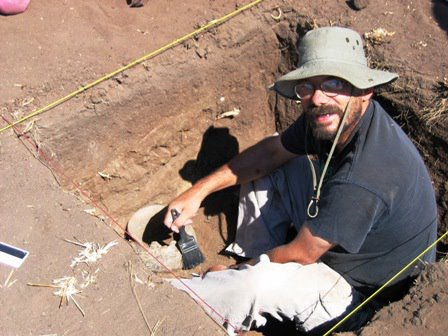In my previous post on historical inscriptions at High Rock Canyon, I got sidetracked with the discussion of religious intolerance and neglected to pose a question to my fellow archaeology bloggers (or anyone who wants to weigh in on the matter): should sites like High Rock Canyon be opened to the public?
As someone who is in the business of managing the nation’s cultural resources, this is a constantly debated question. On the one hand, allowing public access and promoting the existence of a cultural site (be it historic or prehistoric) poses the risk of individuals who will vandalize, or worse, loot the site. Many of my colleagues in cultural resources management feel very strongly that public access to archaeological sites should be severely restricted. There are many of us, however, who believe (equally strongly) that the appreciation for history is collectively fostered by education and access. If we are not protecting sites for public benefit then why bother? Certainly there are all shades of opinion in between. No one arguing for public access is suggesting we post site records on the internet (although we have had interesting discussions locally whether certain high profile archaeological sites shouldn’t be on visitor/interpretive maps). The questions for me are 1) what are the costs/benefits of public access?...and 2) to what degree should access be afforded (advertise the site? Provide a location on a map people may or may not pick up? I’ll tell you if you ask?...)?
So, what do my fellow archaeologists around the blogosphere think about public access to sites?
Subscribe to:
Post Comments (Atom)




5 comments:
From a Swedish point of view, the question's premises are kind of hard to fathom. In Sweden, all land is open to tourists unless fenced off. We have no trespassing laws.
Archaeology will wither and die if the public's interest in sites and finds isn't cultivated. It's more important for the future of archaeology and the heritage to give good people access to sites and information about them than that we keep everyone out to avoid vandalism in the short term.
As to your first question. The benefit of public access is that there is intrinsic value allowing people access to sites such as this. I believe very strongly that people should be allowed to access to our shared cultural heritage. Otherwise, what is the point of archaeology?
The cost is trickier. Ultimately, open public access will lead to the destruction of the resource, either through outright desecration or from less malevolent behaviors such as "chalking" or "rubbings."
Balancing the needs of preservation, vs our responsibility to share heritage resources is an exacting balancing act.
Ultimately, I'd recommend the long view. Your not just responsible for sharing this resource with the public, your also responsible for sharing this site with the same public's children, and their children, and so on.
As to your second question, to what degree should access be afforded? I would advise against open access or plotting the site on a tourists map. If I was in this situation, I'd develop some sort of interpretive device like a website or a kiosk to share the history with people in the region. Then partner with some sort of local organization that could provide a guided interpretive tours.
This arrangement has worked quite well with a number of rock art sites in Northern Arizona.
Best of luck with your effort, it seems like a neat place.
Doug gann
Personally, I think the decision needs to be made on a case by case basis. Some of the factors involved in my opinion need to be:
Can the site be viewed without being destroyed?
How accessible will it be even if it is "advertised?"
Most importantly, will increased awareness of the site get it more protection? Sometimes, the best way to protect something is to make it more accessible to people.
The Grand Canyon as a whole is an example of this in my opinion: the mere fact that so many people want to see it gives it's preservation value.
One of the biggest criticisms that I hear against archaeology and archaeologists is that we are a greedy group who hoards knowledge and objects in our ivory tower. I feel very strongly that If the public is to respect the work of archaeology they need to be included in it.
Thank you for introducing me the wonderful information.And .....Totally boring.!
Post a Comment